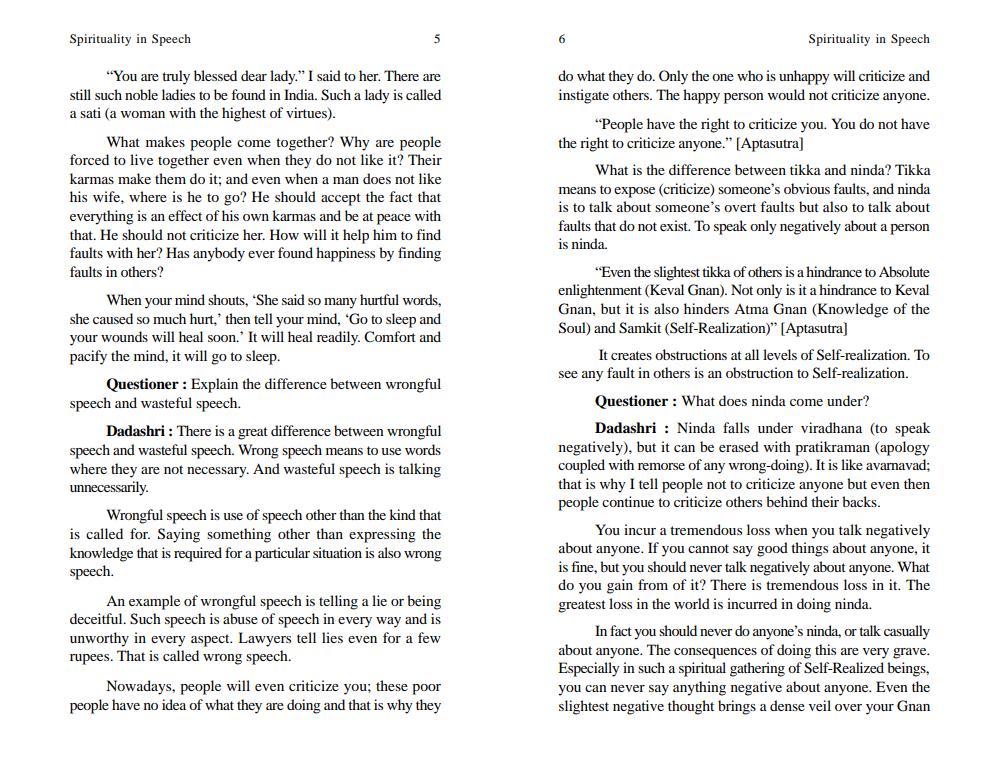Book Title: Spirituality in Speech Author(s): Dada Bhagwan Publisher: Mahavideh Foundation View full book textPage 9
________________ Spirituality in Speech "You are truly blessed dear lady." I said to her. There are still such noble ladies to be found in India. Such a lady is called a sati (a woman with the highest of virtues). 5 What makes people come together? Why are people forced to live together even when they do not like it? Their karmas make them do it; and even when a man does not like his wife, where is he to go? He should accept the fact that everything is an effect of his own karmas and be at peace with that. He should not criticize her. How will it help him to find faults with her? Has anybody ever found happiness by finding faults in others? When your mind shouts, 'She said so many hurtful words, she caused so much hurt,' then tell your mind, 'Go to sleep and your wounds will heal soon.' It will heal readily. Comfort and pacify the mind, it will go to sleep. Questioner: Explain the difference between wrongful speech and wasteful speech. Dadashri : There is a great difference between wrongful speech and wasteful speech. Wrong speech means to use words where they are not necessary. And wasteful speech is talking unnecessarily. Wrongful speech is use of speech other than the kind that is called for. Saying something other than expressing the knowledge that is required for a particular situation is also wrong speech. An example of wrongful speech is telling a lie or being deceitful. Such speech is abuse of speech in every way and is unworthy in every aspect. Lawyers tell lies even for a few rupees. That is called wrong speech. Nowadays, people will even criticize you; these poor people have no idea of what they are doing and that is why they Spirituality in Speech do what they do. Only the one who is unhappy will criticize and instigate others. The happy person would not criticize anyone. 6 "People have the right to criticize you. You do not have the right to criticize anyone." [Aptasutra] What is the difference between tikka and ninda? Tikka means to expose (criticize) someone's obvious faults, and ninda is to talk about someone's overt faults but also to talk about faults that do not exist. To speak only negatively about a person is ninda. "Even the slightest tikka of others is a hindrance to Absolute enlightenment (Keval Gnan). Not only is it a hindrance to Keval Gnan, but it is also hinders Atma Gnan (Knowledge of the Soul) and Samkit (Self-Realization)" [Aptasutra] It creates obstructions at all levels of Self-realization. To see any fault in others is an obstruction to Self-realization. Questioner: What does ninda come under? Dadashri Ninda falls under viradhana (to speak negatively), but it can be erased with pratikraman (apology coupled with remorse of any wrong-doing). It is like avarnavad; that is why I tell people not to criticize anyone but even then people continue to criticize others behind their backs. You incur a tremendous loss when you talk negatively about anyone. If you cannot say good things about anyone, it is fine, but you should never talk negatively about anyone. What do you gain from of it? There is tremendous loss in it. The greatest loss in the world is incurred in doing ninda. In fact you should never do anyone's ninda, or talk casually about anyone. The consequences of doing this are very grave. Especially in such a spiritual gathering of Self-Realized beings, you can never say anything negative about anyone. Even the slightest negative thought brings a dense veil over your GnanPage Navigation
1 ... 7 8 9 10 11 12 13 14 15 16 17 18 19 20 21 22 23 24 25 26 27 28 29 30 31 32 33 34 35 36 37 38 39 40 41 42 43 44 45
